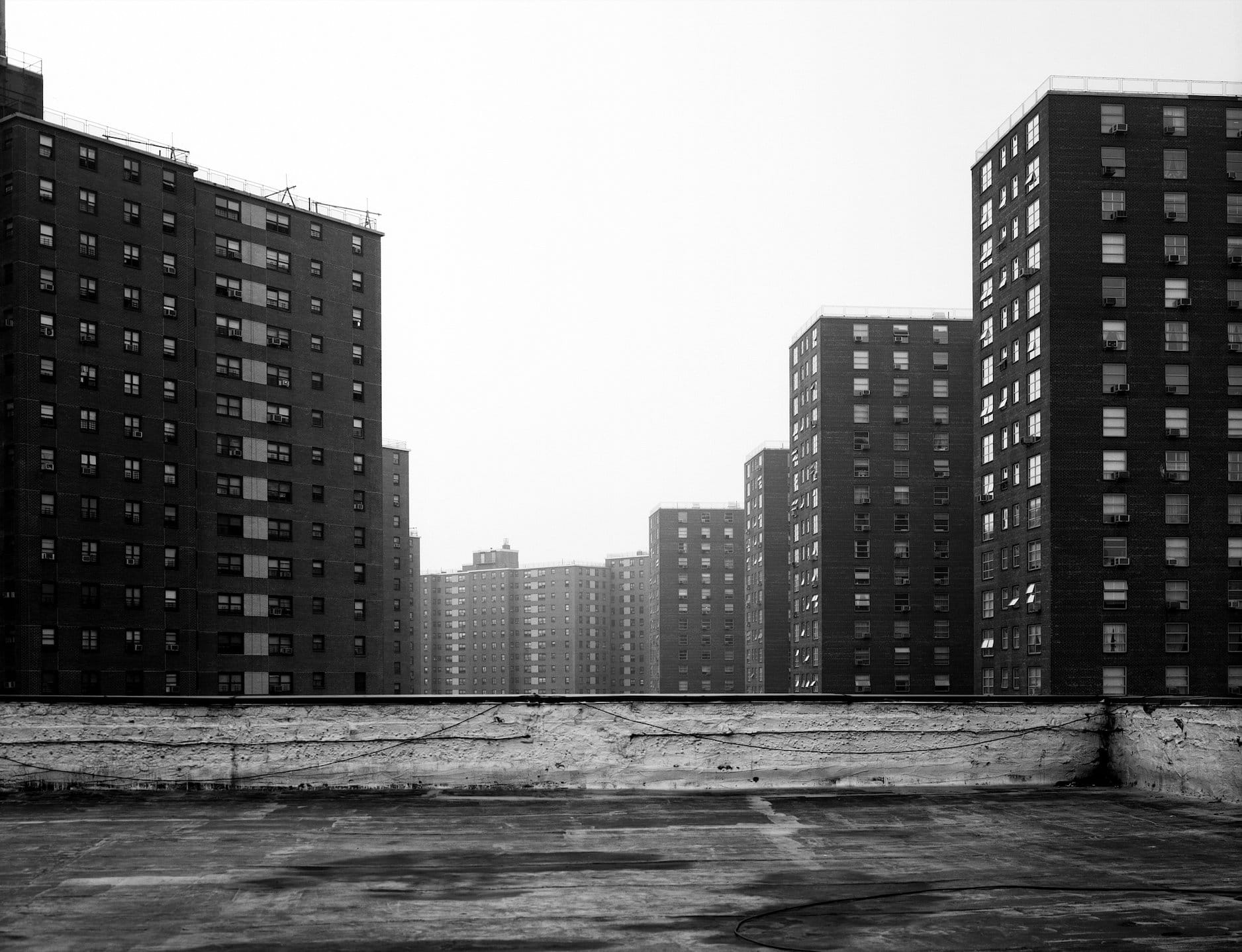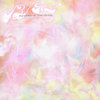Words With: Kiernan Laveaux
Growing up queer and trans in Ohio; DJing as an artform; music as a communal force and conduit for love and joy.
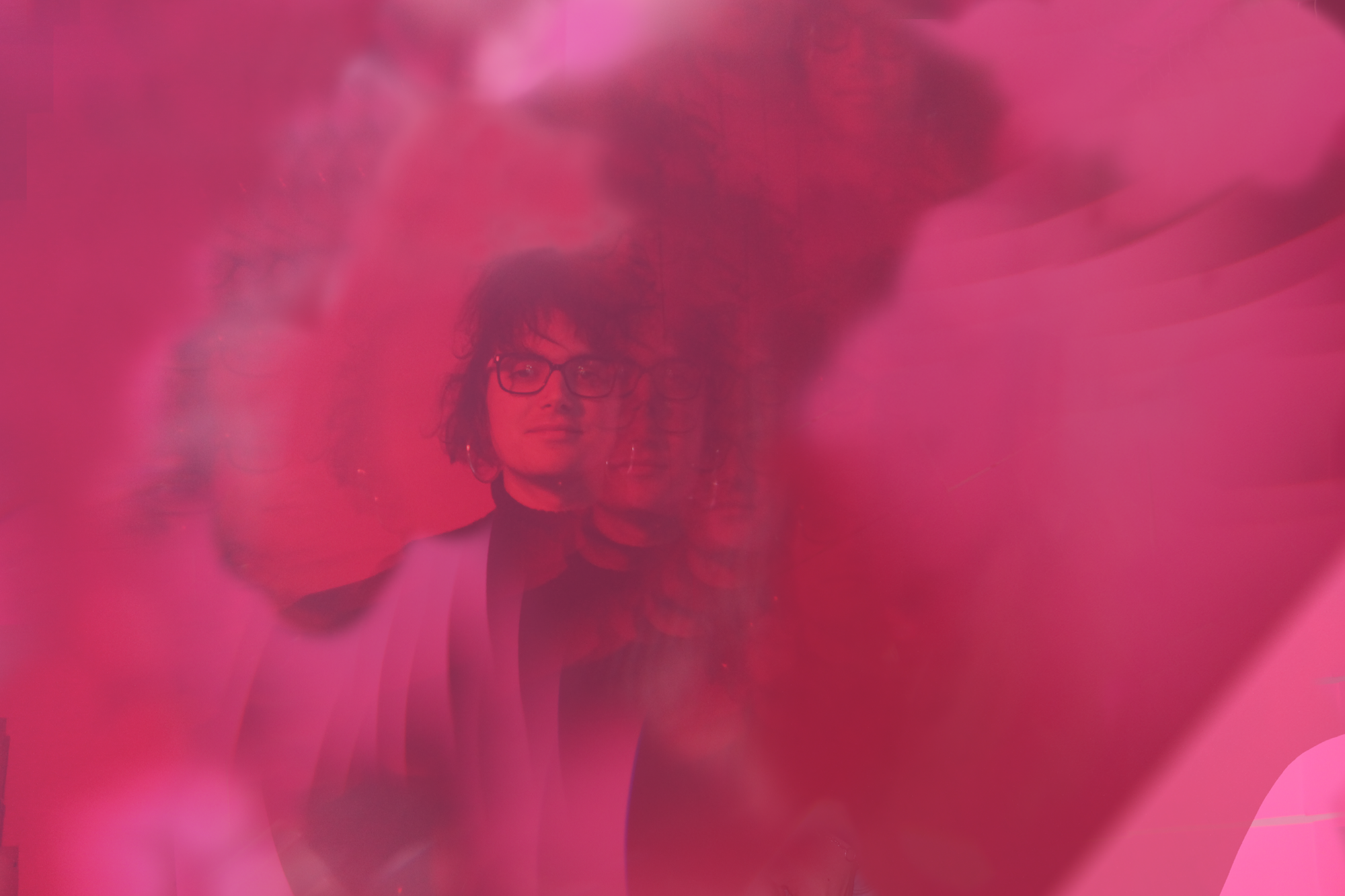
I first met her in 2018, when she came to San Francisco with In Training, a Cleveland-based queer DJ collective and party series she co-founded in 2014. She and I bonded over a shared love of weird industrial music and became fast friends.
In 2022, the standing monthly date for Vague Terrain, a left-field club night I co-founded, fell for the first time on December 2, the anniversary of the Ghost Ship fire in Oakland. Kiernan Laveaux was close with many we lost in the fire and many who survived; we booked her to DJ, beside a live set from my dear friend and collaborator Nihar Bhatt. The night was ecstatic and celebratory, one of the best we put on.
This autumn, we spoke at length, discussing growing up queer and trans in Ohio; the founding of In Training; the necessity and the challenge of building community; her roots and inspiration as a DJ; DJing as an artform; producing a record and launching a label; and music as a communal force and conduit for love and joy.
The following is an edited transcript of our conversation.
the roots
I got started as a DJ 10 years ago, to the month. I started right after I graduated from high school—I was in that 17-coming-into-18-year-old zone of my life, which was, unanimously, the worst time I've ever had being alive.
I was very newly out—out fully as a trans woman, which had been bubbling up for the prior 17 years. I had just met Aerin [Ercolea], and Aerin is maybe the catalyst, to be honest, in this story. She was living in Erie, Pennsylvania—which I don't know if you know anything about Erie, but it sucks. It's like the city that's in between Cleveland and Pittsburgh. She and I connected online and through some friends at hardcore shows, and at that time, I was listening to electronic music more consciously—I was really into GAS [aka Wolfgang Voigt].
My favorite GAS record.
I don't think at that point I was really even clocking GAS, or other stuff I was listening to, as "dance" or "electronic music." I was really into ambient music and noise—I was super into Ascetic House, which was also another entryway for me.
And so I would just get high as hell every day after school and listen to [GAS album] Pop and just, like, wish that something would change. I was just having a really awful time being a teenager, and I was kind of like, There's no way these are the best years of my life. Eventually I graduated, and me and Aerin had decided that we would live together.
We moved in together around August 2014, and around that time, I was having a lot of experiences in my life where, I was just like, Holy shit, honestly, no one understands me. The Cleveland music scene—DIY scene, punk scene—at that time, there was just no presence of anyone like me, and the angle of Cleveland hardcore and punk was very nihilistic, very self destructive, very markedly un-PC. It's kind of like the middle ground between "fuck PC" and "fuck anti-woke," you know. I feel like I was getting—maybe not harassed at shows, but it was a hostile environment in my day-to-day life navigating the city. I was just kind of miserable—just being a trans woman in Cleveland in 2014 was crazy challenging.
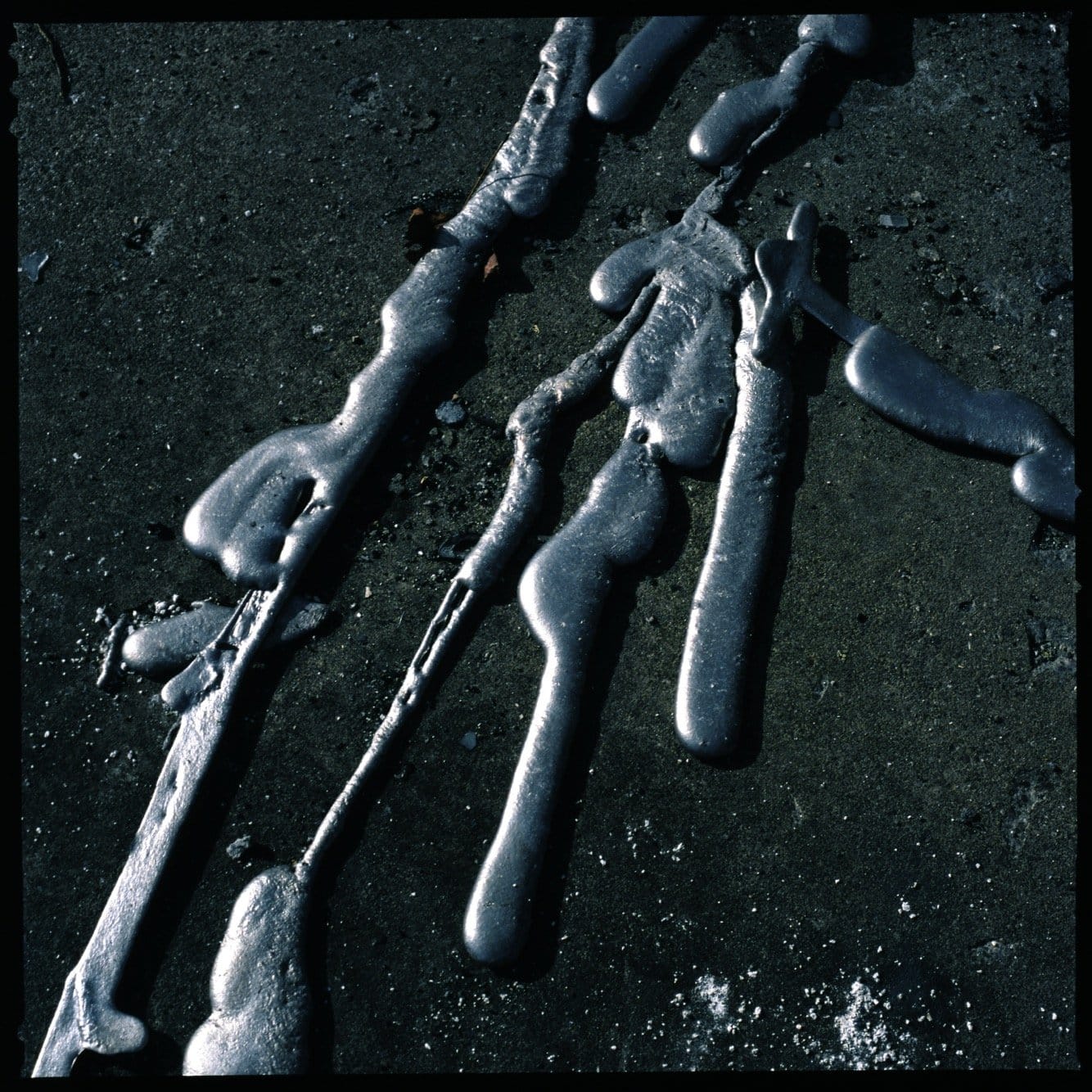
At that time, I went on tour with a no-wave band I was in, and I was tired of just playing all this really complicated music. And I thought, Damn, I just want a four-four kick at 126 BPM. I remember Marshstepper played in the basement of a spot where, eventually, we would start throwing parties—I saw Marshstepper and Youth Code, and I was into EBM, and I have always been into industrial because of my mom, but until then, I never really clocked a lot of that music as music I could DJ.
In Training
So Aerin wanted to start a queer dance party, and then she met Brian [Bohan], who goes by Father of Two, and they were like, Yo, we're the only two people in this bar who know who Silent Servant and Arthur Russell are. Aerin then came home and said, I met this gay dude who knows who Silent Servant is. I think we're gonna start a party. And that, basically, is how In Training started.
That's when I started DJing—on Virtual DJ. I didn't even use headphones back then. I was playing stuff like Terrence Dixon and Container. And then around that time we met our friend Miah, who's ADAB, and I'd say Miah, and Brian, and Aerin, all of them, to an extent, taught me how to DJ. We didn't get CDJs, or a mixer, or any proper gear until March 2016, two years into this party.
When we first started the party, it was mostly live sets. Aerin was always into playing vinyl. She was the first one to really get into playing vinyl. I think she got a cheap pair of decks early on, but everybody else was playing off either Traktor or Virtual DJ. I think some of our friends had literally, like, the only pair of CDJs in Cleveland, or something. We borrowed those a couple times.
For context, Cleveland has very little DJ lineage. I wasn't going out and seeing dance music, or DJs, at all. I was seeing loads of hip-hop, punk, noise, metal, but I didn't go out to an existing club and say, Oh, I want to do that. We were all just kind of like, Fuck it, I guess I'm playing "Warm Leatherette" on Virtual DJ.
Circa 1978: "Warm Leatherette" by The Normal aka Daniel Miller, founder of Mute Records.
Miah, ADAB, is the first person I ever really saw DJing, who was my friend, where I was like, Holy fuck, that was sick. That's art. That was January 2015, and that was also my first gig, basically. To this day, I feel like that history is something people still don't really get—especially my peers and people my age. This is gonna be my old man moment, but we really had to turn the fucking sewer water into wine—we didn't even have enough money to get CDJs for so long. And when we got CDJs, they were CDJ 900s which I still love, but like—what we built up, we really built from nothing.
In Training's attitude was very much: Fuck you, we're queer, we fight back. We had Limp Wrist play the first anniversary party—which was too punk for the ravers, and the punks weren't really raving enough. Everyone pitted for Limp Wrist, and then the party was kind of empty—but that was kind of our vibe.
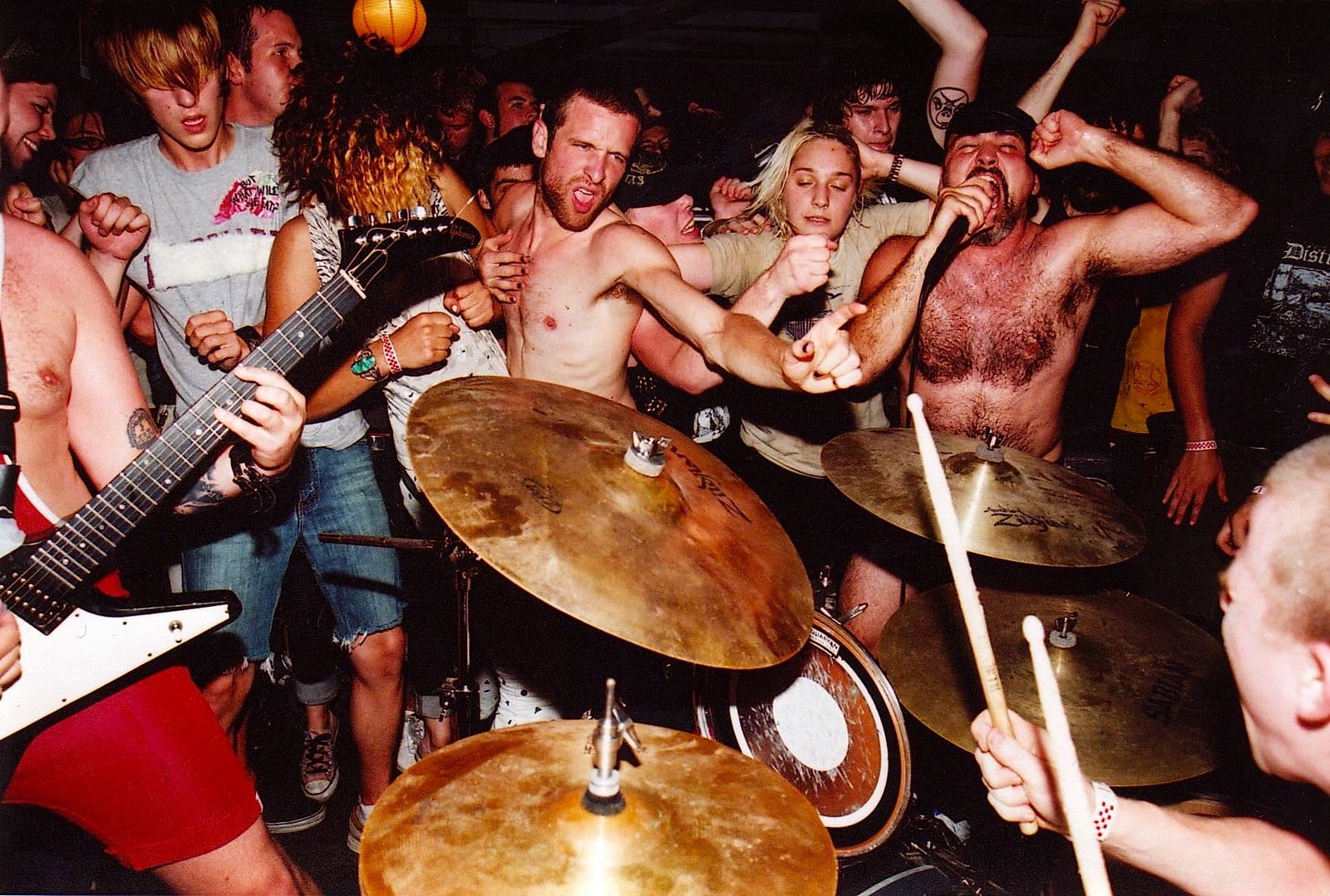
At that time, Carrie and Miah were doing a party called Heaven Is In You, a multi-genre situation where they played hip-hop, dance music, experimental electronics, crossing over different parts of the music community. Doing a lot of these parties, actually, a lot of people either involved in them or who came to them, ended up coming out, which is cool in some degree. Other friends, Ayn [fana] and Sam [Glacial23] did a party called Disco Paradiso that was all freestyle, Italo, synth pop. That was my introduction to a lot of that music, to what new beat is, and this whole other realm of music that I liked.
At this point, even though In Training is the event I was most directly involved with, many of us in Cleveland were all kind of colluding with these parties and events. All of these things I just mentioned, from hip-hop to new beat to Limp Wrist and back again, are where a lot of my DJ chutzpah comes from.
on community
It's easy for people to want to say, Oh, well, you must have built this queer community. And it's not really the case—we did build a community to an extent, but honestly, the community was very mixed. I feel like every party, at that time, was really mixed, and I think that's actually kind of powerful.
For In Training, we got caught up in very early "safe space" discussions. Something that's kind of hard to explain to people is how we came at it—not like doing it in a carceral, "screening" way. It was just that the place we threw our parties at was a very lawless environment. So it was really like, if you come here and call someone a faggot—we can, and will, kick your ass and throw you out. And that's just how Cleveland worked at that time, and kind of still does. That's really the survival mode that I felt like I was in. It wasn't like, Oh, you're too male passing to be here. It was like, There are people that might pull up and try to hurt somebody, and if you come to this party, we will handle some shit if you need us to. And that got really out of hand.
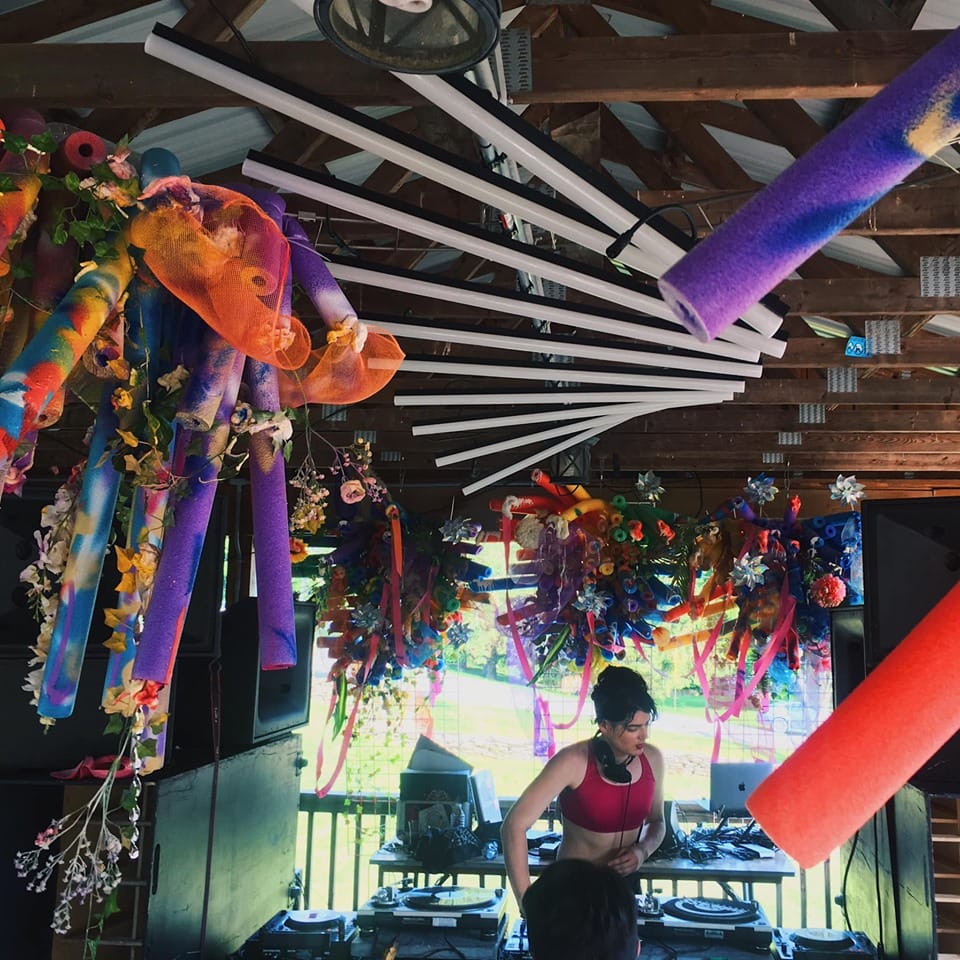
I don't really go back home to play a lot. Cleveland's not really the place where you go back and have a DJ residency, or whatever.
But I did go back and play about a year ago, and a lot of people were like, We didn't understand what y'all were trying to bring to this place. And I think that's maybe a little bit tragic and maybe a little bit sad, but I view it more—I take the good out of it, because I think my whole trajectory as an artist to this day has been like doing things people are gonna take time to catch up to, and I don't mean that in a self-aggrandizing way. I just really don't think anyone had done what we, our whole crew, had done before, and not in a proud way. It was literally just like, We're gonna die if we don't just make some noise and find some other like-minded people.
We did our final party in October 2018—Via App played live, which was a very appropriate send off. And I feel like it was also such a product of that time, live techno coming back a little bit. There just wasn't really even a lot of space for queer and trans people playing live machines.
Within this whole era, I was also going to a lot of parties. I was going to Hot Mass, I was going to Columbus, I was going to Detroit, I was going to Chicago, going to Buffalo. Cleveland never really had all night raves—all of our shit ended at 2 a.m. So it kind of had this gig vibe, and then we would go to all these other places, and go to the late night parties in the morning. Between Chicago to Pittsburgh, and then between Buffalo, Detroit, and Columbus, that's where the long form, extended set, long blend, Midwest DJ life got into me.
practice and technique
When I'm preparing for gigs, I like to know what time I'm playing. I like to know who's playing before and after me. I like to know what the capacity of the venue is. I like to know as much as I can about the setting, basically, and then from there, I prep by just playing music. I've practiced at home a voracious amount. I've put in my 10,000 hours. So to prepare, I'll just play records at home for an hour and a half or two hours, and they're actually rarely what I play at the gig, but just the act of playing music puts me in the right headspace.
For something like Sunset Campout, where I'm closing the whole festival, I did think about, What are my last three songs gonna be? And maybe I pick a BPM range I want to be in. I'm not really too adherent to that, but I'm not always someone who's going to go from 90 to 130 [BPM] and back again. I also keep a lot of playlists on my USB from past gigs. I do that just because you never really know when the inspiration might strike you. And then I pick some records and maybe they make it with me or maybe they don't. But in general, I do a lot of prep work to keep my mind open and improvisational. I saw Irreversible Entanglements play recently, which is Moor Mother's free jazz group, and I feel like watching them perform felt almost more like how I feel when I DJ more than when I see a lot of DJs where they're like, Here's some reference points we're going to bounce between.
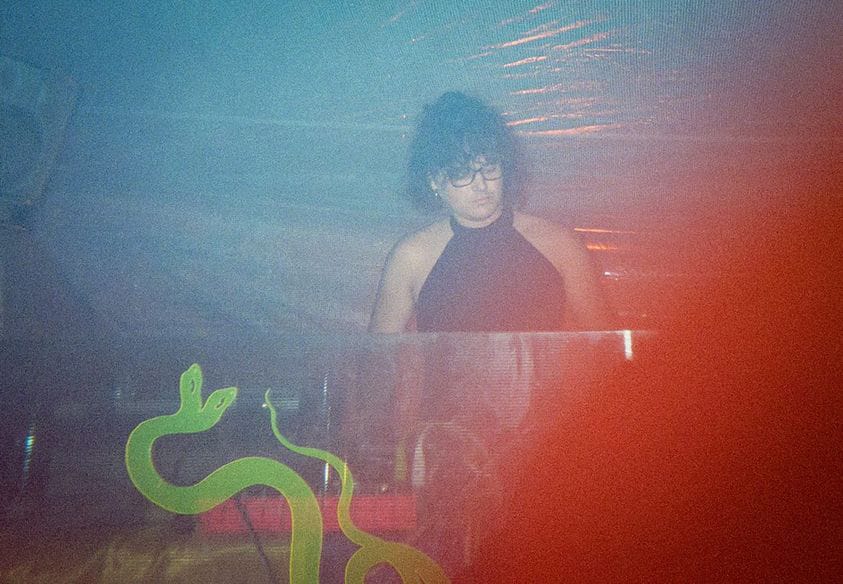
If I can get lightly theoretical for a second—Albert Ayler is from one part of Cleveland over from where I'm from, and Albert Ayler was known as being a musical iconoclast. He was like, What if I took music and just took it to the point where it almost stops being music? That energy is something that I feel like a lot of Northeast Ohio musicians can relate to—and what I do is beyond where I'm from at this point, but it is also with me, fundamentally, and it makes me who I am. I just take that from him [Ayler] in a beautiful way, you know.
I do feel like I've developed a unique style of DJing. I've been playing vinyl since 2017, and I'm equally into playing vinyl and CDJs. But I feel like playing vinyl is where all of my really unique shit came from, and then taught me how to rock the CDJs harder. I remember when I got really into African Head Charge—massive, massive influence on me, not just Adrian Sherwood but the entire On-U-Sound universe—and the collusion of post-punk and dub techniques. I remember being like, I want my DJ sets to be able to sound like when On-U-Sound just sounds like it's collapsing into itself. Getting into dub was really powerful for me, and really opened my mind up to technique—using a lot of echo and delays, and also playing with feedback.
I use echo and delay all over the place at this point, but I first started using them to transition between tracks. So actually, I kind of really hate just fading some shit out of the other track when I'm mixing. I don't like taking the bass to eight o'clock and then seven o'clock and all that shit. I hate EQing. I just want to—I kind of think of it like a movie. I'm just like, Next [scene], next [scene]. Of course, I had to learn how to do all those delicate, layered EQ blends to actually learn how to be like, Well, fuck that. [laughing]
Music to shake your hips to and decalcify your pineal gland.
We used to have a practice space in Cleveland we called The Hole, because it was just a room with black walls and red light—there were no windows. Seven of us shared it, and that's where our gear lived. So Carrie, who is Ghost Noises, who came from this hip-hop DJ background, and like Madlib or Ras G, how they would DJ—they're huge influences on my mixing style. Ras G, rest in peace, he would just drop an air horn and then the next track starts. And Carrie showed me how, on the Pioneer [mixer], you can echo a track out and just start the next one—and that can be a complete statement, mix-wise, which is something that had not been apparent to me before. A lot of my style as a DJ, in my opinion, is very indebted to hip-hop. And whether people hear that or not, I think it comes across sometimes—like when I'm scratching, how it breaks the mold of linearity.
Ultimately, a lot of my technique and tricks come from my friends, first and foremost. Second is dub and hip-hop and also my background in noise. I've been to as many basement noise shows as anyone—you know, I wasn't going and seeing Masters At Work, I was in the basement listening to Nostilevo, right? But then I take that energy and try to apply that to house music, which I've been calling eschatological house music. It's like doomed house music or something, maybe.
production and release
I just put out my first record. It's me and my friend Johnny Zoloft. It's called Pancake of the Infinite. We made a five track EP, and our friends MIRA MIRA and Gladstone Deluxe are on four of the five tracks. I released it on an imprint I'm starting called Sweet Abyss. Sweet Abyss is my current focus right now, and it started as a night where I had my own DJ residency, where I could play freeform shit. You know the vibe. My partner, Jules, aka Malzof, does it with me. Jules has been amazing, helping me with their booking and A/V skills, and inspired me to manifest an event to play strange music at. We envision Sweet Abyss as an alternative third space for people across various spectrums, for playing music and freaking out.
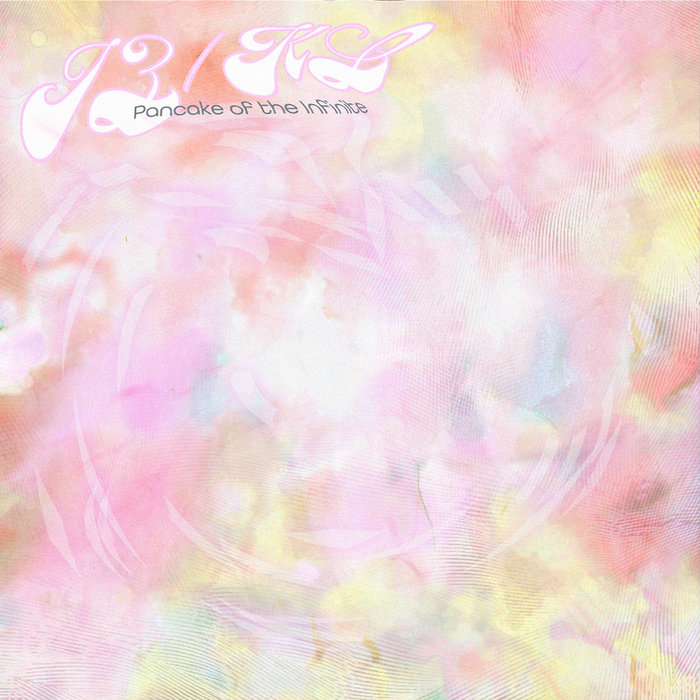
CCL is working on the imprint side of it with me. They're partly the inspiration behind making Sweet Abyss a multimedia imprint, since it’s something we’ve wanted to do for years, to build worlds together.
Most of the record is me and Justin, aka Johnny Zoloft, but Gladstone and Samira [MIRA MIRA] are on tons of it, so it's almost like a four piece—they played on it and then we arranged their parts.
There's a lot of live drumming, some acoustic instrumentation that we've mutated into the tracks, but also some drum machines, bits of synth. It's all arranged in Ableton—it's pretty 50/50, in and out of the box. Justin is for sure the engineer. I'm learning as I go, they have more experience doing that.
no turning back
Getting into producing has been very satisfying. But I don't think I could stop DJing if I wanted to. I feel like I'm meant to play music—the universe has thrown so many karmically synchronous happenings my way that it's kind of hard to ignore. The accessibility of where DJing is at right now is what's really interesting to me, and how these lines between tempos, club music, noise, all that are actually kind of burning down in real time.
Downtempo freak dance and twisted rave.
I'm trying to be a little bit maternal with it now. Honestly, what keeps me going is the people who are younger than me, now coming up, who are on some really interesting, cool shit. I think I hold an interesting place in the conversation, because I'm kind of 50/50—new school, old school. I feel like I'm almost some of the last generation of people who have been able to interact with the history of what came before us. One of the big motivators for me getting into music to begin with was being from the Midwest—and then finding out that house and techno are, functionally speaking, from the Midwest. I remember being really young and excited about how it felt like dance music was combining science fiction-like revolutionary ideas and even dissolving boundaries between race and gender, and empowering people in a really legitimate way—not in a "the marginalized body is resonant" way, but in a way of, We actually can build a space, that might exist for only six hours, but for those six hours—we're gonna put this shit into practice.
I really feel like I've seen that happen, but unfortunately, it's not enough to change the world. I wish that love was the universal currency of humanity. It should be, but also love is a close cousin of rage—and I also came into this shit because I was young, angry, and distraught, so rage has brought me to love, and also to music. I mean, I met Jules because we went to go see Mike Huckaby play.
What keeps me going now is the knowledge that I have gained with my own two eyes. I've seen what this shit can accomplish in a microcosm, and we only got, like, 30 years left of 'cosming, so we might as well just keep that shit rolling. I'm starting to get to that point of being Young Mother—I won't put people's names out there, per se, but I'm seeing people my age, and younger, who are bringing some fresh, interesting ideas to the table. And at the same time, we do need to make sure we're honoring these older folks who came before us, who didn't really get the honor.
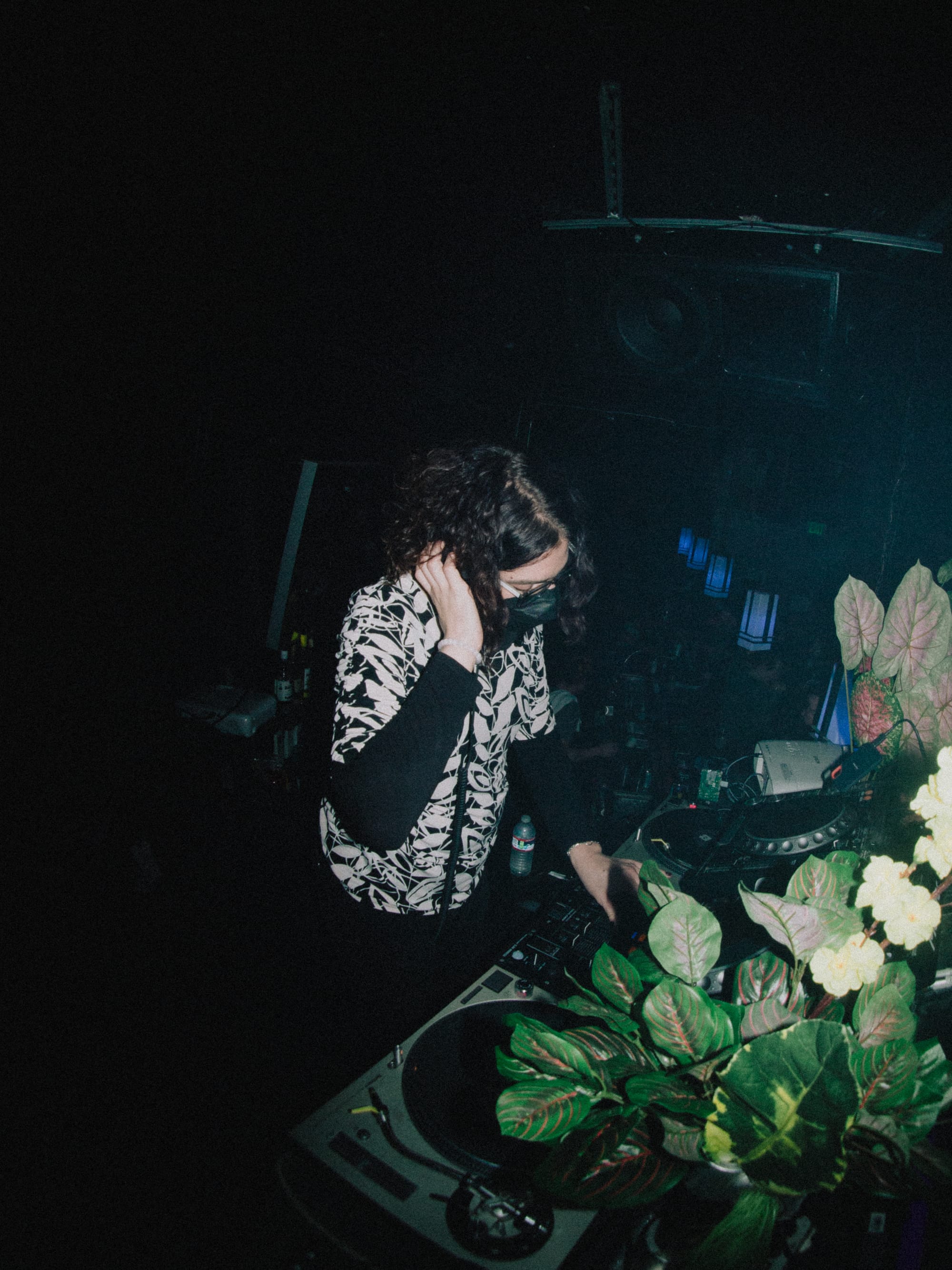
But I feel like the conversation around what is "valid" as far as DJing goes is much less rigid than when I started. I'm both really excited about—I hate the word "diversity," but just the variety of people, or whatever, who are able to be recognized as DJs now. But then I'm also intensely critical, in a sense, of the way that that's been enveloped into capital. And that's kind of just how it's gonna be, and that shit, on some days, brings me a lot of happiness, and then on other days, it makes me really angry about the way that our joy is basically sold, commoditized, and used to line people's pockets—who don't really care about any of that.
So, yeah, I definitely am reaching my jaded, mid-life crisis point of my involvement in all of this shit, but at my core, I'm just never gonna stop. What keeps me interested is other people. I think I'm interesting, but I'm not interesting in isolation.
I just think—yeah, my life would just be awful without the last 10 years of this shit [my involvement in dance music] happening. I mean, not totally, but: music really does heal. You know, I can't fucking believe it sometimes, but I've just seen the way it can change people. There's this John Coltrane quote that this Ras G beat starts with: Music is an instrument—it can change the thought patterns and ideas of people. I think about that a lot—where I think that music is kind of useless as this political tool, but it's also useless to act like it's not useful as a political tool.
That kind of shit just keeps me going. I've seen too much shit to turn back.
